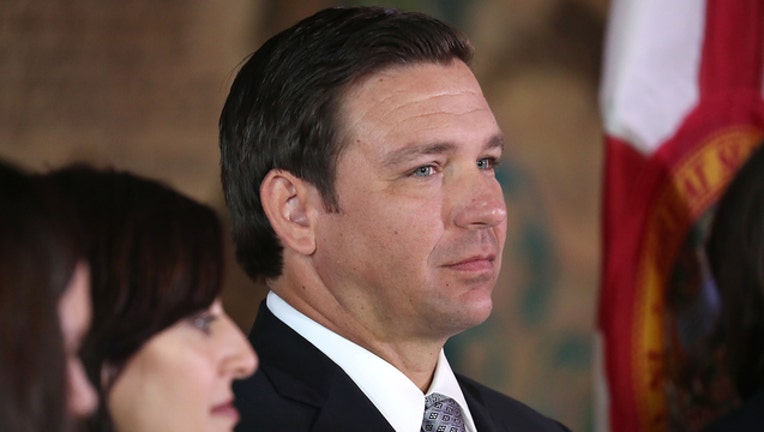DeSantis signs bills to curb human trafficking, allow needle exchange programs for drug users

(Photo by Joe Raedle/Getty Images)
TALLAHASSEE, Fla. (NSF) - Gov. Ron DeSantis on Wednesday signed 15 bills, including a measure that allows needle-exchange programs across the state and a plan to help curb human trafficking.
The needle-exchange bill (SB 366) is aimed at preventing the spread of diseases such as HIV by intravenous drug users and builds off a Miami-Dade County pilot program that lawmakers authorized in 2016. Lawmakers were told this spring that the pilot, run by the University of Miami, had taken 275,000 used syringes off the streets.
The bill, spearheaded by Sen. Oscar Braynon, D-Miami Gardens, Rep. Shevrin Jones, D-West Park, and Rep. Rene Plasencia, R-Orlando, will allow county commissions throughout the state to approve needle-exchange programs.
Past proposals to allow the programs outside of Miami-Dade County failed. But this year’s bill was unanimously approved by the Senate and drew only three dissenting votes in the House.
During the legislative session, Sen. Dennis Baxley, R-Ocala, said he initially feared that the proposal could create more addiction by supporting “negative” habits. But before voting for the bill, he said the initiative was "truly building a health intervention."
While a big part of the reason for the Miami-Dade pilot was trying to reduce the spread of HIV and other diseases, supporters said it also has played an important role in battling the state’s opioid crisis. Advocates told lawmakers that the program had helped reverse 1,100 opioid overdoses through use of the drug Narcan.
An early iteration of this year’s legislation would have allowed the use of tax dollars to help fund the needle-exchange programs, but House Speaker Jose Oliva, R-Miami Lakes, objected. Lawmakers ultimately did not allow the use of state or county money for the programs, which can receive private funds.
DeSantis’ office Wednesday night released the list of 15 bills he had signed. Also among them was a measure (HB 851) to toughen human-trafficking laws.
The bill, sponsored in the House by Rep. Heather Fitzenhagen, R-Fort Myers, and in the Senate by Sen. Lauren Book, D-Plantation, includes creating a database of people convicted of soliciting prostitution and placing new requirements on the operation of massage parlors, strip clubs and hotels.
"This law sends a powerful message to traffickers and pimps: The state of Florida is closed for business," Book said in a statement issued after the signing was announced. “When we curb the demand for the illegal sale and purchase of sex, we also curb the profitability of human trafficking --- and take a stand against the enslavement of men, women and children in communities across our state.”
DeSantis on Wednesday also traveled to Tampa to sign a bill that will offer alternative treatment options to U.S. military veterans with traumatic brain injuries or post-traumatic stress disorder,
The bill (HB 501), sponsored by Rep. Mel Ponder, R-Destin, and Sen. Tom Wright, R-New Smyrna Beach, will allow the Florida Department of Veterans’ Affairs to contract with a state university or Florida College System institution to provide the following alternative treatment options: accelerated resolution therapy; equine therapy; hyperbaric oxygen therapy; music therapy; and service animal training therapy.
DeSantis, who served in the Navy, said he’s long supported alternative-treatment concepts, such as training dogs to work with veterans suffering from post-traumatic stress disorder. DeSantis, who held a bill-signing ceremony at the University of South Florida Office of Veteran Success, said he pushed for alternative treatments while serving in Congress.
“The people that would go in the VA (U.S. Department of Veterans Affairs), literally it would be they would get counseling and they would get prescription medication,” DeSantis said. “So, we had veterans that commit suicide on the back end of that. I spoke with family members, and they really believed that was not the proper treatment.”

